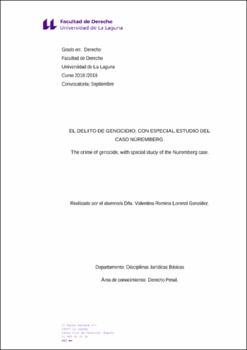El delito de genocidio, con especial estudio del caso Núremberg
Date
2019Abstract
It was during the course of World War II that the most cruel and heinous crimes
have occurred. That brought with it a change to international law, being the reason
why the typification of acts that until now were not regulated, nor did a conviction
be established for them. It was, therefore, the need for a legal instrument to punish
these and the will to prevent crimes like those committed from being committed
again that motivated an action of legal creation, whose main objective was to ensure
international peace and security, and the collaboration of all nations was needed to
achieve it. This was how the typification of genocide occurred, whose elements of
the type are, not only the realization of typical conduct, but also realizing this with
a special intention and awareness of destroying a particular group. In this way, we
will proceed to the study of the Nuremberg Statute and the legacy that led to the
condemnation of the acts committed during World War II, making a special deal of
the crime of genocide. Ha sido durante el transcurso de la Segunda Guerra Mundial cuando se han
producido los crímenes más crueles y atroces jamás vistos. Ello trajo consigo un
cambio para el derecho internacional, al ser la razón por la cual se procedió a la
tipificación de actos que hasta el momento no eran regulados, ni se establecía una
condena por ellos. Fue, por tanto, la necesidad de un instrumento jurídico que
castigara estos y la voluntad de evitar que crímenes como los cometidos se volvieran
a cometer que motivaron una acción de creación jurídica, cuyo principal objetivo era
garantizar la paz y seguridad internacional, siendo necesaria la colaboración de todas las naciones para conseguirlo. Así fue como se produjo la tipificación del delito de
genocidio, cuyos elementos del tipo son, no sólo la realización de la conducta típica,
sino también la realización de esta con una especial intención y consciencia de
destruir a un grupo determinado. De esta manera, procederemos al estudio del
Estatuto de Núremberg y el legado que conllevó la condena de los actos cometidos
durante la II Guerra Mundial, haciendo un especial detenimiento en el delito de
genocidio.





